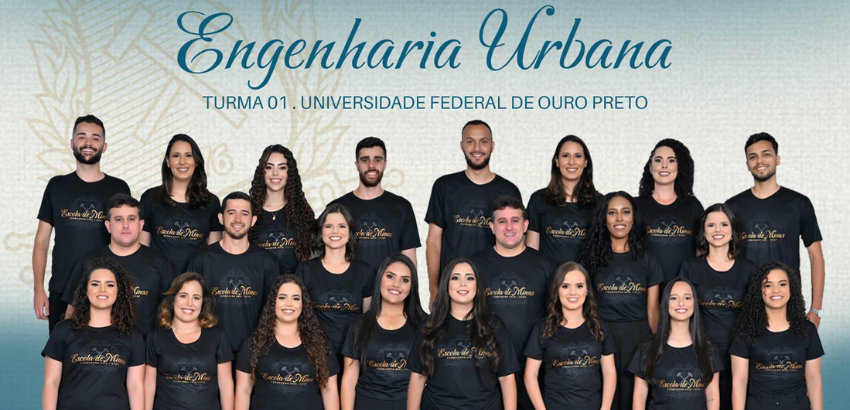Initiated in 2018, the Urban Engineering program in the Federal University of Ouro Preto (UFOP), the first in Brazil at the undergraduate level, has just graduated its first students. During undergraduation, faculty members and students faced several challenges, such as the COVID-19 pandemia and other obstacles due to the newness of the program, including market insecurity.
Since it is a new program, the field of work and its professional relevance is still relatively unknown. The coordinator of the Urban Engineering Department, Aline de Araújo Nunes, reports that she was surprised by the magnitude of the program; during the elaboration of the curriculum, she could understand the importance of this qualification. “When I entered the Urban Engineering Department, I didn’t have a real understanding of how the program could fulfill a deficient and also important area of the cities. And when we were creating the Department and making adjustments, we had the real notion concerning the range and complexity of the actions that this program would promote, considering the various challenges in the cities.” she points out.
The Urban Engineering program focuses on the construction and maintenance of systems and urban infrastructures, in order to improve people's quality of life. These systems include, but not only, transport and mobility networks, sanitation and water networks, waste management, power systems and telecommunications. Thus, the program curriculum aims to work out the integration of different systems. “Nowadays, we see a lot of professionals who work in urban areas with specific training. And we want professionals that have integrative training, that can understand the importance of analyzing geological and geotechnical systems as a single one, along with water, mobility and transport systems.” Aline says, adding that this integration happens by the development of interdisciplinary projects in the courses.
Ana Luiza Silva Santos Felix, urban engineer and UFMG master’s degree student in “Programa de Pós-Graduação em Saneamento, Meio ambiente e Recursos Hídricos” (Sanitation, Environment and Hydrical resources graduation program) says that discovered the program during UFOP’s Fair of Professions (Mostra de Profissões). “I always thought that sanitation, urban mobility, territorial planning were essential subjects, along with so many other approaches that we study and are in the routine of the cities. I saw myself with the opportunity to begin this new challenge, to be an undergraduate in the first urban engineering class of the country.” she says.
Matheus Gonçalves, also a UFOP undergraduate student in urban engineering, says that his professors were important to keep the program working during the pandemic, and highlighted the challenge to be distant from the academic community during that time.“Our professors were comprehensive and committed themselves, offering activities, which contributed a lot to students’ learning and course development. Being away from the University was my biggest challenge, because we missed the experiences with colleagues and also the in-person contact with professors and activities. Simultaneously, we faced a lot of uncertainties about the pandemic. These new circumstances have shown students’ situations and have completely changed the way we study and interact” he reminded.
PANDEMIC - When the Covid-19 pandemic started, the program were still in its initial stages, and needed to adapt to the remote learning context. To the coordinator, the challenges were significant, since that class was in its technical stage. “20.1 class was the first to start the fifth semester, entering the technical stage, and for the first time we had to adapt to remote learning tools. Our faculty and technical servants worked together to accomplish lab experiments, and thanks to our infrastructure it was possible to work the knowledge out with the students”, concludes the coordinator.
To graduate means to win for Ana Luiza Felix. “I am the first female engineer in my family. I always had my mother’s incentive to be whatever I wanted to be, only requiring that I studied — and It was fundamental. I feel that all her efforts to keep me in the University were worth it. I think my degree is important because it shows that people like me can also reach places such as engineering” she highlights. To Mateus Gonçalves, the feeling is of “accomplished duty” and gratitude for the founder professors and also being part of this development.
Recently, the program was recognized by the Engineering and Agronomy Regional Council and by the Education Ministry. According to the coordinator, the uncertainty about the accreditation and the pandemic made lots of students give up, but that situation is being reversed, since the market has received the new engineers with a positive attitude. “We expect that this student giving up ceases, once students realize our program is acknowledged and have its graduates welcomed in the market.” With joy, the coordinator adds that a lot of the students, even those in the internship phase, have already been hired by regional companies.







